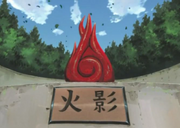No edit summary |
(→Trivia) |
||
| (31 intermediate revisions by 18 users not shown) | |||
| Line 1: | Line 1: | ||
| − | [[File:Will of Fire Sculpture.png|right|thumb|The Will of Fire being depicted where the Kage are buried in |
+ | [[File:Will of Fire Sculpture.png|right|thumb|The Will of Fire being depicted where the Kage are buried in Konoha's cemetery.]] |
| − | The {{translation| |
+ | The {{translation|'''Will of Fire'''|火の意志|Hi no Ishi}} is a recurring element throughout the ''[[Naruto (series)|Naruto]]'' series. It is an ideal rooting from [[Asura]]'s belief that love is the key to peace.<ref>''Naruto'' chapter 462, page 12</ref> It would eventually become the [[Nindō|life philosophy]] which [[Hashirama]] and the [[Senju clan]] lived by, which has since been passed on to many ninja from [[Konohagakure]] as a part of their spiritual heritage.<ref>''Naruto'' chapter 329, page 7</ref> It states that the entire village is like a large family unit and every Konoha shinobi with the Will of Fire loves, believes, cherishes, and fights to protect the village, as previous generations had done before them.<ref>''Naruto'' chapter 139, pages 5-6</ref> In Konoha, there is a sculpture of a flame in the [[Konoha Cemetery|cemetery]] representing this will, it has the kanji for {{translation|"Hokage"|火影|lit meaning=Fire Shadow}} inscribed below it. Hashirama was also depicted sitting on a throne-like chair with a similar sculpture in the background.<ref>''Naruto'' chapter 399, page 8</ref> |
| − | According to [[Hiruzen Sarutobi]], this is what gives Konohagakure shinobi the strength to continue fighting against all odds, building willpower and strength of character. It is also symbolic of the hopes and dreams of the previous generation being passed to the next; for example, when [[Asuma Sarutobi]] was killed, his hopes and dreams were passed to [[Shikamaru Nara]], who asked that |
+ | According to [[Hiruzen Sarutobi]], this is what gives Konohagakure shinobi the strength to continue fighting against all odds, building willpower and strength of character. It is also symbolic of the hopes and dreams of the previous generation being passed to the next; for example, when [[Asuma Sarutobi]] was killed, his hopes and dreams were passed to [[Shikamaru Nara]], who asked that Asuma's will would in turn be passed on to his and [[Kurenai]]'s [[Kurenai's Child|child]].<ref name="chapter328">''Naruto'' chapter 328, page 8</ref> |
| − | This is also seen with the shinobi of the village identifying a {{Translation|"King"|玉|Gyoku}} which is simply anything or anyone they want to protect. When he was younger, [[Asuma Sarutobi]] was asked by his [[Hiruzen Sarutobi|father]] who the 'King' was. Conflicted over whether it was the [[Daimyō]] of the [[Land of Fire]] or the [[Hokage]], he was unable to answer him. Much later in his life, Asuma realised what his father meant and came to view his then unborn child as his 'King'.<ref name="chapter328"/> Shikamaru later came to |
+ | This is also seen with the shinobi of the village identifying a {{Translation|"King"|玉|Gyoku}} which is simply anything or anyone they want to protect. When he was younger, [[Asuma Sarutobi]] was asked by his [[Hiruzen Sarutobi|father]] who the 'King' was. Conflicted over whether it was the [[Daimyō]] of the [[Land of Fire]] or the [[Hokage]], he was unable to answer him. Much later in his life, Asuma realised what his father meant and came to view his then unborn child as his 'King'.<ref name="chapter328"/> Shikamaru later came to realise that the 'King' was the unborn generations of Konohagakure to come,<ref>''Naruto'' chapter 342, page 16</ref> and [[Konohamaru Sarutobi]] believes that they are the civilians of the village that cannot fight for themselves.<ref>''Naruto: Shippūden'' episode 234</ref> |
== Trivia == |
== Trivia == |
||
| − | * It has been noted that the [[Uchiha clan]]'s {{translation|[[Curse of Hatred]]|憎しみの呪い|Nikushimi no Noroi}} is fated to clash against the Will of Fire, and |
+ | * It has been noted that the [[Uchiha clan]]'s {{translation|[[Curse of Hatred]]|憎しみの呪い|Nikushimi no Noroi}} is fated to clash against the Will of Fire, and Obito believes that [[Sasuke Uchiha]] and [[Naruto Uzumaki]], both respectively embodying the polar ideals, are destined to fight to the death.<ref>''Naruto'' chapter 462, pages 14-15</ref> |
| − | * [[Iwagakure]] has a similar philosophy known as the {{translation|"[[Stone Monument#Will of Stone|Will of Stone]]"|石の意志|Ishi no Ishi}}.<ref>''Naruto'' chapter 575</ref> |
+ | * [[Iwagakure]] has a similar philosophy known as the {{translation|"[[Stone Monument#Will of Stone|Will of Stone]]"|石の意志|Ishi no Ishi}}.<ref>''Naruto'' chapter 575</ref> |
| + | * Some notable [[Uchiha]] have been able to transcend the limitations of their clan-thinking and held the Will of Fire philosophy such as [[Itachi]], [[Shisui]], and [[Kagami]]. [[Obito Uchiha]] also held to such beliefs in his youth, and ultimately died following them.<ref name="Obito">''Naruto'', chapter 688</ref> Sasuke Uchiha, who was seemingly lost to the Curse of Hatred, ended up coming to believe in this philosophy after conceding defeat to Naruto in their final clash.<ref>''Naruto'', chapter 698</ref> |
||
| + | ** [[Kakashi]] theorised that Obito, despite succumbing to his clan's hatred, never truly lost his Will of Fire, and the two conflicting ideals were tearing him up inside. This would be proven true when Obito regained his former self against [[Madara]], subsequently giving up his life to protect his newfound comrades.<ref name="Obito"/> |
||
== References == |
== References == |
||
| Line 14: | Line 16: | ||
[[Category:Naruto Terms]] |
[[Category:Naruto Terms]] |
||
| + | [[es:Voluntad de Fuego]] |
||
Revision as of 21:15, 19 November 2014

The Will of Fire being depicted where the Kage are buried in Konoha's cemetery.
The Will of Fire (火の意志, Hi no Ishi) is a recurring element throughout the Naruto series. It is an ideal rooting from Asura's belief that love is the key to peace.[1] It would eventually become the life philosophy which Hashirama and the Senju clan lived by, which has since been passed on to many ninja from Konohagakure as a part of their spiritual heritage.[2] It states that the entire village is like a large family unit and every Konoha shinobi with the Will of Fire loves, believes, cherishes, and fights to protect the village, as previous generations had done before them.[3] In Konoha, there is a sculpture of a flame in the cemetery representing this will, it has the kanji for "Hokage" (火影, literally meaning: Fire Shadow) inscribed below it. Hashirama was also depicted sitting on a throne-like chair with a similar sculpture in the background.[4]
According to Hiruzen Sarutobi, this is what gives Konohagakure shinobi the strength to continue fighting against all odds, building willpower and strength of character. It is also symbolic of the hopes and dreams of the previous generation being passed to the next; for example, when Asuma Sarutobi was killed, his hopes and dreams were passed to Shikamaru Nara, who asked that Asuma's will would in turn be passed on to his and Kurenai's child.[5]
This is also seen with the shinobi of the village identifying a "King" (玉, Gyoku) which is simply anything or anyone they want to protect. When he was younger, Asuma Sarutobi was asked by his father who the 'King' was. Conflicted over whether it was the Daimyō of the Land of Fire or the Hokage, he was unable to answer him. Much later in his life, Asuma realised what his father meant and came to view his then unborn child as his 'King'.[5] Shikamaru later came to realise that the 'King' was the unborn generations of Konohagakure to come,[6] and Konohamaru Sarutobi believes that they are the civilians of the village that cannot fight for themselves.[7]
Trivia
- It has been noted that the Uchiha clan's Curse of Hatred (憎しみの呪い, Nikushimi no Noroi) is fated to clash against the Will of Fire, and Obito believes that Sasuke Uchiha and Naruto Uzumaki, both respectively embodying the polar ideals, are destined to fight to the death.[8]
- Iwagakure has a similar philosophy known as the "Will of Stone" (石の意志, Ishi no Ishi).[9]
- Some notable Uchiha have been able to transcend the limitations of their clan-thinking and held the Will of Fire philosophy such as Itachi, Shisui, and Kagami. Obito Uchiha also held to such beliefs in his youth, and ultimately died following them.[10] Sasuke Uchiha, who was seemingly lost to the Curse of Hatred, ended up coming to believe in this philosophy after conceding defeat to Naruto in their final clash.[11]
- Kakashi theorised that Obito, despite succumbing to his clan's hatred, never truly lost his Will of Fire, and the two conflicting ideals were tearing him up inside. This would be proven true when Obito regained his former self against Madara, subsequently giving up his life to protect his newfound comrades.[10]
References
- ↑ Naruto chapter 462, page 12
- ↑ Naruto chapter 329, page 7
- ↑ Naruto chapter 139, pages 5-6
- ↑ Naruto chapter 399, page 8
- ↑ 5.0 5.1 Naruto chapter 328, page 8
- ↑ Naruto chapter 342, page 16
- ↑ Naruto: Shippūden episode 234
- ↑ Naruto chapter 462, pages 14-15
- ↑ Naruto chapter 575
- ↑ 10.0 10.1 Naruto, chapter 688
- ↑ Naruto, chapter 698
